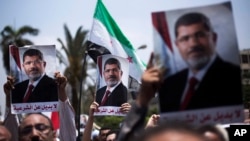WASHINGTON —
Middle East experts are pessimistic about the outcome of a showdown between Egyptian President Mohamed Morsi, a growing opposition movement clamoring for his resignation and the powerful military that has demanded a solution to the crisis by today.
And according to the experts, a solution to the crisis may be difficult because none of the players in the Egypt drama have indicated what they expect to come next if Morsi is, in the end, forced to step down.
“Unfortunately, I don’t see any positive scenarios unfolding that quickly return Egypt to a political equilibrium and stability,” said Amy Hawthorne, a senior fellow with the Atlantic Council’s Rafik Hariri Center for the Middle East.
“The military and the opposition forces have already given up on Morsi and would like him to step down,” Hawthorne added. “Morsi and the Muslim Brotherhood and other Islamist groups are digging in very deeply, refusing to be pushed out from power.”
Hawthorne predicted Egypt’s Islamist groups would react harshly if Morsi, who was elected in the nation’s first democratic elections a year ago, is forced from office.
Egypt’s opposition groups have been demonstrating for months again Morsi and his Islamic Brotherhood, claiming they are ignoring other political parties and trying to impose strict Islamic practices on the nation. The showdown reached a boiling point on Sunday when millions demonstrated against Morsi in cities throughout Egypt.
Monday’s ultimatum
Then on Monday, the powerful Supreme Council of the Armed Forces (SCAF) issued an ultimatum: Morsi would have to cut a deal with the opposition within 48 hours or the Army would step in with its own solution.
On Tuesday evening, Morsi went on national television and again rejected the military’s ultimatum, saying his government was elected democratically and would not give up power.
Morsi’s Muslim Brotherhood followers said the Army ultimatum amounted to a military coup and that they would resist it in the streets. At least seven people were reported killed in in street clashes in Cairo by Tuesday evening.
“Whatever the outcome, be it a full intervention or a military-mediated settlement, it will be unlikely to bring any semblance of stability to the country,” said Mohamed El-Shewy, a researcher at the Cairo-based Egyptian Initiative for Personal Rights.
Mohamed El-Menshawy, a scholar at the Middle East Institute in Washington, says another problem is that neither the opposition nor the Army have adequately spelled out what kind of solution they are seeking to the crisis.
“None of the major political players in Egypt appear to have a practical answer to the burning question: What is next?” El-Menshawy said. “For instance, no one has produced a politically sound ‘exit strategy’ beyond the loud demand to remove Morsi, and to hold a new presidential elections.”
Amy Hawthorne fears that increasing violence between opposing factions in the streets could at some point make a military solution the only option.
“It seems that the military is the actor that has the decisive power and the force behind them,” Hawthorne said. “That leaves the U.S. in a huge dilemma because it wants to maintain good relations with the military, which it had for decades, and wants to support the legitimacy of an elected leader, no matter who that leader is.”
Hawthorne says the two U.S. goals may be becoming contradictory.
Different interpretations of US position
In a phone call with Morsi late on Monday night, President Barack Obama reportedly confirmed that the United States would continue to deal with Egypt's elected president and to support the country's ongoing transition to democracy. Obama also reportedly encouraged Morsi to demonstrate that he is responsive to public concerns.
Morsi reportedly interpreted Obama’s statement as U.S. backing of his legitimacy. But Wahid Abdel Magid of the opposition National Salvation Front pointed out that President Obama stressed that democracy is about more than elections; it is also about ensuring that the voices of all Egyptians are heard and represented by their government.
Hawthorne argues that the U.S. position as expressed by President Obama is very clear: “The current situation in Egypt must be resolved through a political process and that President Morsi needs to take serious steps to respond to the demands and concerns of the opposition.”
But Hawthorne also says she says the situation in Egypt is dynamic and changing rapidly. She says the military’s actions could result in a variety of scenarios over the coming days.
“We have seen in other countries around the world, military stepping in to influence or force a certain political outcome without taking control, without directly assuming power.” Hawthorne said. “It is often difficult to interpret that as a military coup, but the U.S. does not want the military to impose a solution or to return to a military rule of Egypt.”
And according to the experts, a solution to the crisis may be difficult because none of the players in the Egypt drama have indicated what they expect to come next if Morsi is, in the end, forced to step down.
“Unfortunately, I don’t see any positive scenarios unfolding that quickly return Egypt to a political equilibrium and stability,” said Amy Hawthorne, a senior fellow with the Atlantic Council’s Rafik Hariri Center for the Middle East.
“The military and the opposition forces have already given up on Morsi and would like him to step down,” Hawthorne added. “Morsi and the Muslim Brotherhood and other Islamist groups are digging in very deeply, refusing to be pushed out from power.”
Hawthorne predicted Egypt’s Islamist groups would react harshly if Morsi, who was elected in the nation’s first democratic elections a year ago, is forced from office.
Egypt’s opposition groups have been demonstrating for months again Morsi and his Islamic Brotherhood, claiming they are ignoring other political parties and trying to impose strict Islamic practices on the nation. The showdown reached a boiling point on Sunday when millions demonstrated against Morsi in cities throughout Egypt.
Monday’s ultimatum
Then on Monday, the powerful Supreme Council of the Armed Forces (SCAF) issued an ultimatum: Morsi would have to cut a deal with the opposition within 48 hours or the Army would step in with its own solution.
On Tuesday evening, Morsi went on national television and again rejected the military’s ultimatum, saying his government was elected democratically and would not give up power.
Morsi’s Muslim Brotherhood followers said the Army ultimatum amounted to a military coup and that they would resist it in the streets. At least seven people were reported killed in in street clashes in Cairo by Tuesday evening.
“Whatever the outcome, be it a full intervention or a military-mediated settlement, it will be unlikely to bring any semblance of stability to the country,” said Mohamed El-Shewy, a researcher at the Cairo-based Egyptian Initiative for Personal Rights.
Mohamed El-Menshawy, a scholar at the Middle East Institute in Washington, says another problem is that neither the opposition nor the Army have adequately spelled out what kind of solution they are seeking to the crisis.
“None of the major political players in Egypt appear to have a practical answer to the burning question: What is next?” El-Menshawy said. “For instance, no one has produced a politically sound ‘exit strategy’ beyond the loud demand to remove Morsi, and to hold a new presidential elections.”
Amy Hawthorne fears that increasing violence between opposing factions in the streets could at some point make a military solution the only option.
“It seems that the military is the actor that has the decisive power and the force behind them,” Hawthorne said. “That leaves the U.S. in a huge dilemma because it wants to maintain good relations with the military, which it had for decades, and wants to support the legitimacy of an elected leader, no matter who that leader is.”
Hawthorne says the two U.S. goals may be becoming contradictory.
Different interpretations of US position
In a phone call with Morsi late on Monday night, President Barack Obama reportedly confirmed that the United States would continue to deal with Egypt's elected president and to support the country's ongoing transition to democracy. Obama also reportedly encouraged Morsi to demonstrate that he is responsive to public concerns.
Morsi reportedly interpreted Obama’s statement as U.S. backing of his legitimacy. But Wahid Abdel Magid of the opposition National Salvation Front pointed out that President Obama stressed that democracy is about more than elections; it is also about ensuring that the voices of all Egyptians are heard and represented by their government.
Hawthorne argues that the U.S. position as expressed by President Obama is very clear: “The current situation in Egypt must be resolved through a political process and that President Morsi needs to take serious steps to respond to the demands and concerns of the opposition.”
But Hawthorne also says she says the situation in Egypt is dynamic and changing rapidly. She says the military’s actions could result in a variety of scenarios over the coming days.
“We have seen in other countries around the world, military stepping in to influence or force a certain political outcome without taking control, without directly assuming power.” Hawthorne said. “It is often difficult to interpret that as a military coup, but the U.S. does not want the military to impose a solution or to return to a military rule of Egypt.”












